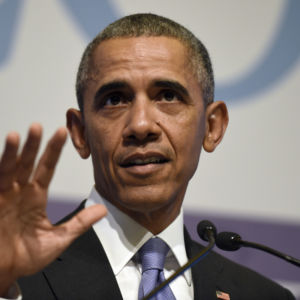President Obama in his final press conference of the year told reporters the administration is preparing to talk with Silicon Valley about solutions to tracking terrorist suspects communicating via encrypted services online.
“Our law enforcement and intelligence professionals are constantly monitoring public posts,” the president said from the White House Friday afternoon. “One of the things we will be doing is engaging with the high tech community to find out how we can in an appropriate way… track a suspected terrorist.”
The press conference comes one day after authorities investigating last month’s attacks in Paris revealed at least some of the attackers communicated via popular encrypted communication applications WhatsApp and Telegram, both of which feature end-to-end encryption, making it impossible for anyone other than the sender or receiver to view the content.
CNN broke the news Thursday citing unidentified officials, and did not elaborate on how investigators knew the suspects used the services.
“It is very difficult for us to detect lone-wolf plots,” Obama said. “You don’t always see it. They’re not always communicating publicly.”
“If you have a private communications between two individuals, that’s harder to discern by definition,” the president added.
The suspicion, put forth but law enforcement, intelligence agencies, the press and lawmakers since the attacks has reignited the debate on Capitol Hill thought largely put to rest earlier this year, when FBI Director James Comey told Congress the administration had decided against calling for legislation mandating companies provide the government access to encryption.
“If they communicate in darkness and you can’t shine a light on it, quite honestly you just can’t stop it,” Texas Republican and House Homeland Security Committee Chairman Michael McCaul told a Christian Science Monitor panel last week. “People say why didn’t you see Paris? It was under the radar because they were using an app called Telegram and they were communicating through an encrypted application.”
Comey and others have warned since last year, when Apple and Google announced default end-to-end encryptions services over users’ communications, that such standards would make it more difficult to surveil and apprehend criminals and terrorists “going dark” online.
“We’re going to have to really review what we can do both technically, as well as consistent with our laws and values, to try and discern more rapidly some of the potential threats that may be out there,” the president added, foregoing the term “encryption” in place of “private communications through various social media or apps.”
Friday’s press conference was the second time Obama has alluded to the encryption issue since the Islamic State-inspired attacks in San Bernardino earlier this month.
“And as groups like ISIL grew stronger amidst the chaos of war in Iraq and then Syria, and as the Internet erases the distance between countries, we see growing efforts by terrorists to poison the minds of people like the Boston Marathon bombers and the San Bernardino killers,” Obama said during a televised appearance in the Oval Office last week.
“And that’s why I will urge high-tech and law enforcement leaders to make it harder for terrorists to use technology to escape from justice,” the president added.
Investigators have yet to announce if the attackers in the San Bernardino shooting used any form of encryption to plan their assault.
“We’re going to have to recognize that no government is going to have the capacity to read every single person’s text or emails or social media,” Obama said.

